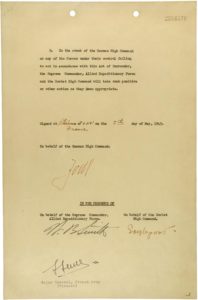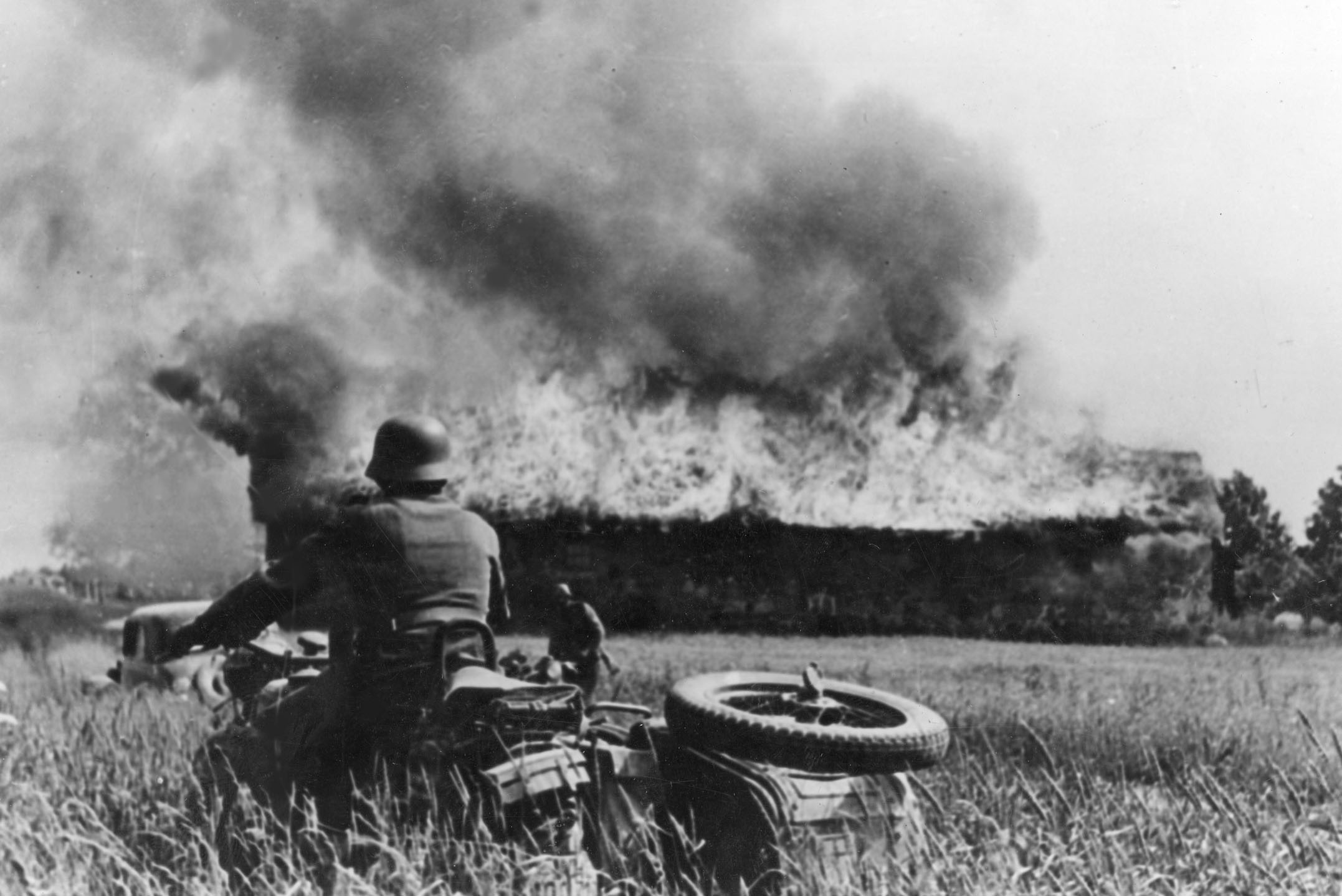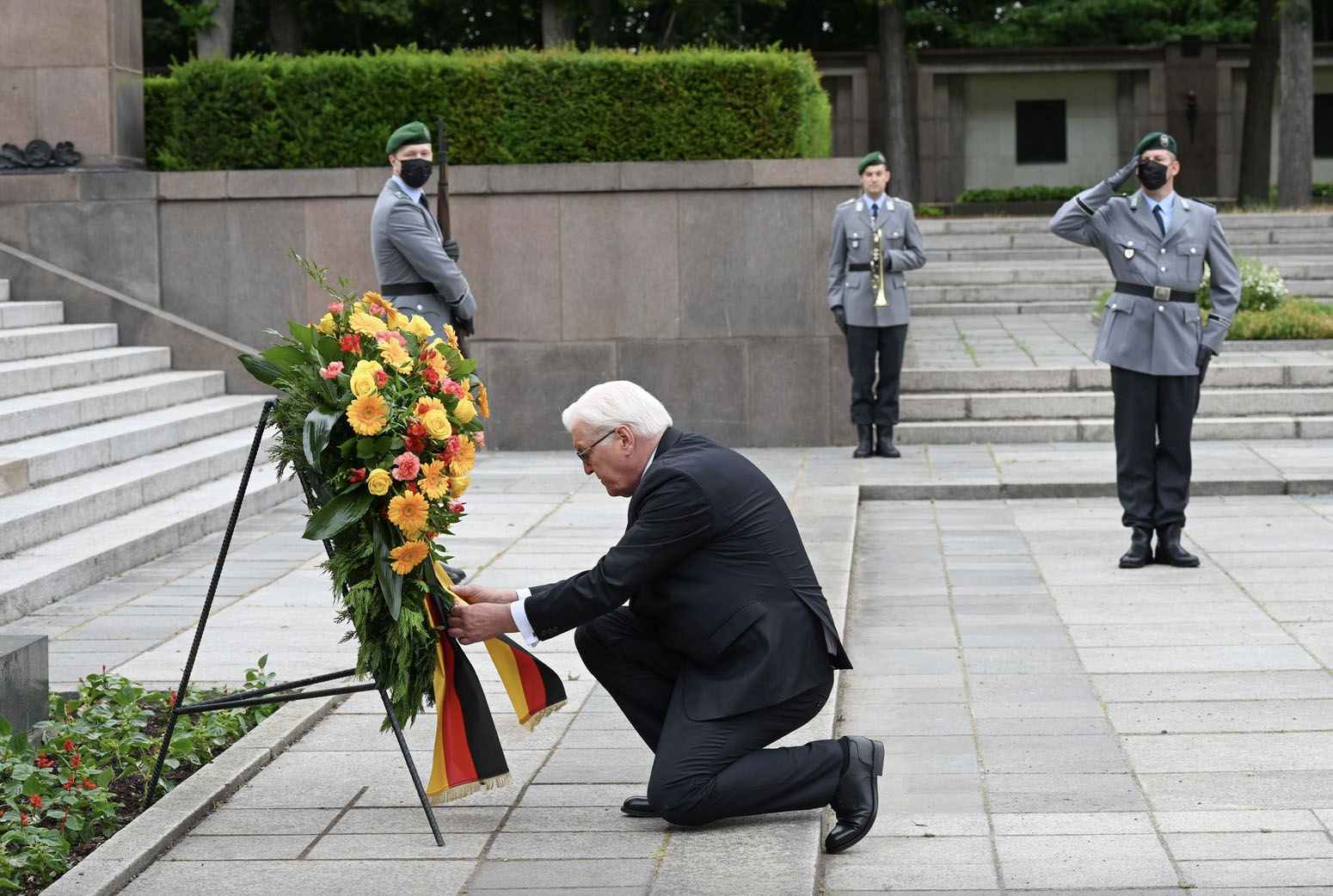During a June 18 remembrance event marking the 80th anniversary of Operation Barbarossa, Nazi Germany’s invasion of the Soviet Union, German President Frank-Walter Steinmeier appealed to present generations to work towards peace with nations in Eastern Europe.
“Today I want to address you, the citizens of all the countries which suffered during the German war of annihilation—I ask you to ensure, indeed let us all ensure, that we do not confront each other again as enemies,” Steinmeier said in an emotional speech at the German-Russian Museum Berlin-Karlshorst, a history museum jointly operated by German and Russian authorities.
At the site where leaders of Allied forces gathered on May 8-9, 1945, to accept Nazi Germany’s unconditional surrender, the German president addressed diplomats from nine embassies, including representatives from Moldova, Armenia, Belarus, Kyrgyzstan, and Russia’s ambassador to Germany, Sergei Nachaev. The location was significant to recall the spirit of international cooperation against Nazism, according to Steinmeier.
“We are here to remember the huge contribution of the men and women from the ranks of the Red Army who fought against Nazi Germany. We remember their courage and resolve, we remember the millions who risked and lost their lives alongside their American, British and French allies as well as many others, in order to free us all from the National Socialist tyranny,” Steinmeier said as he inaugurated an open-air exhibit memorializing Soviet prisoners of war and genocide victims.

“Every war brings devastation, death and suffering. And yet this war was different. It was an act of German barbarity,” Steinmeier said. “It cost millions of human lives, laid waste to the continent and—as a consequence—divided the world for decades.”
In a moving address, Steinmeier recounted crimes committed by Nazi Germany during its war against the Soviet Union, launched on June 22, 1941. He described the “Starvation Plan” developed by Nazi authorities to kill civilians and implemented during the Siege of Leningrad; Hitler’s plans to raze cities including present-day St. Petersburg, Moscow and Kiev to the ground; an order by the quartermaster general of the German army in November 1941 declaring that “non-working prisoners of war must starve;” and declarations by Nazi officials that the entire Soviet population “from newborn babies to the very old” were enemies.
Eastern Europeans were “made to pay for the war imposed upon them themselves, with their lives, their property, with everything that was part of their existence,” the German president said.
“Soviet prisoners of war were not thought of as prisoners,” Steinmeier pointed out. “They were robbed of their humanity—dehumanized.” During his speech, he appealed to attendees to defeat the legacy of Nazism by reflecting on shared humanity. “Let us ensure that we do not fail to recognize the human being in others.”
Steinmeier drew attention to the fact that Soviet victims of the Nazi regime have largely been ignored in Germany. There are 3,500 known burial sites of Soviet victims in Germany, but despite echoes of cruelty and the Eastern European dead literally lying not far from their homes, many Germans have been too focused on the hardships of their own prisoners of war in the Soviet Union to pay attention to the harm inflicted on others, Steinmeier asserted.
“At the war’s end, the death toll in the Soviet Union numbered some 27 million people. Twenty-seven million people were killed, murdered, bludgeoned, starved or left to die as a result of forced labor by National Socialist Germany. Fourteen million of them were civilians,” Steinmeier said. “And yet these millions are not as deeply etched in our collective memory as their suffering and our responsibility demand.”

Citing his personal experience of repressed history in Germany, Steinmeier drew attention to a chilling photograph displayed in the new Karlshorst exhibit. The scene of an apparently innocent-looking forest at Schloss Holte-Stukenbrock in East Westphalia becomes something terrifying when closer inspection reveals scars on the trees—the leaves and bark were clawed off by starving Soviet prisoners. This crime scene is “not far away in the East,” Steinmeier said, but “barely an hour from my hometown, from the place where I grew up and where, during my time at school, I learned nothing of what had happened there less than two decades previously.”
He said that German society had “failed” to reflect on “the crimes committed in the east of our continent. The time has come to rectify that.”
He emphasized that recalling the past is not for the purposes of imposing shame, but to build a better future. Although remembering war atrocities places a “heavy burden” on Germans as descendants of those who committed brutal crimes, Steinmeier believes Germans have a special responsibility to work for peace and mutual understanding in today’s world.
“It is not easy for anyone to call to mind the horrors of the past. However, repressing memories, not admitting guilt never makes things easier,” he said. “Only those who learn to understand the traces of the past in the present will be equipped to help shape a future which avoids wars, rejects tyranny and makes possible peaceful co-existence in freedom.”
Steinmeier also drew attention to the fact that willingness of Eastern European nations to forgive Germany has made reconciliation possible today. He said the fact that Germans are welcomed today in Belarus, Ukraine or Russia is “nothing short of a miracle.”
In Russia six years ago, Steinmeier said, he was welcomed by “a large crowd of veterans—upright and proud in their uniforms which had become much too big for them, their hands raised in military salute and tears in their eyes.” He described it as “one of the most moving and lasting memories of my life.”
“What I say to you today is: on this day when we are remembering the millions upon millions who lost their lives, let us also recall how precious reconciliation is when it has grown over the graves of the fallen,” he said.
“This gift of reconciliation gives rise to a great responsibility for Germany. We want, and indeed must, do everything to protect international law and territorial integrity on this continent and to strive for peace with and among the successor states to the former Soviet Union.”
“I bow in sorrow before the Ukrainian, Belarusian and Russian victims—before all victims in the territory of the former Soviet Union,” Steinmeier said in conclusion of his address. MH





